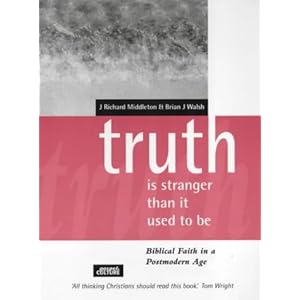by Brian Walsh
 “Assume biblical illiteracy.”
“Assume biblical illiteracy.”
That was the advice from our publisher as Richard Middleton and I were writing our book on postmodernism, Truth is Stranger than It Used to Be.
Assume biblical illiteracy.
“But this is an evangelical Christian publishing house,” we countered.
“Surely our readership knows something of the Bible. These are, after all, mostly evangelical Christians who will read our book.”“Precisely,” came the reply. “They are evangelicals, so assume biblical illiteracy.”
I confess that I’ve found this level of biblical illiteracy to be no respecter of the theological/cultural divide we once identified as evangelical vs liberal.
Indeed, whether you are raised in a Bible memorization tradition or in a liturgical church which reads from three passages of Scripture, plus a Psalm, every Sunday, doesn’t seem to matter when it comes to levels of biblical literacy.
Biblical illiteracy abounds, so keep it simple.
Middleton and I decided to not heed that advice.
Rather than keep it simple, we decided to tell the biblical story again and again in that book, in considerable detail and depth.
Biblical illiteracy is not countered by keeping it simple,
but by inviting people into a full immersion experience in this story.
Call this the ‘throw them in the deep end’ pedagogy.
Paul seems to be up to something similar in Romans.
Writing to a mixed community of Christian Jews and Gentiles, Paul has, from the beginning assumed either that his hearers know the story of Israel and Israel’s scriptures, or that they have a deep hunger and curiousity about that story.
Or maybe Paul just can’t help himself.
Maybe the apostle simply thinks in the vocabulary and symbolism of Israel’s scriptures and can’t think in any other way.
Fact is, it is simply impossible to ready Paul with any sympathy or understanding if you are illiterate in the scriptures of Israel.
“Always read the New Testament with Old Testament eyes,” has been a dictum of mine for some years.
That is nowhere more clear than in Romans.
This letter is soaked in the Hebrew scriptures, abounding in direct quotation, allusion and echo.
At Wine Before Breakfast we just spent five weeks in Romans 8. Five weeks on 39 verses and we are sure that we still haven’t plumbed the depths of what the apostle is up to in this magnificent chapter.
And now we are in the pivotal chapters 9 to 11, which are simply overflowing with quotations from Genesis to Malachi (literally!).
So I’ve suggested to the community that if we are to get any sense of what Paul is up to, we are going to need to follow the references.
We can get ourselves quite the education just by looking up the references.
Where is Paul quoting from?
What is going on in the passages that he cites?
What is he doing with those ancient Hebrew texts?
I know.
Maybe this might sound like a little more work than many of us are interested in at the moment.
Fair enough.
But at least do this. Read the text.
Seriously, friends. Read the text.
Struggle with the text.
Wrestle with the text.
Argue with the text.
Let’s at least give St. Paul that courtesy together.
After wrestling with him for a while, we just might get a blessing.
Though we also might be walking with a limp for the rest of our lives as well.
6 Responses to “Throw Them in the Deep End”
Don’t need no ticket
[…] “They are evangelicals, so assume biblical illiteracy.” […]
Mick Pope
So systematic theologies can act to make us illiterate?
B. Walsh
Umm, yea. But so also can biblical scholarship, oddly enough. The issue, however, isn’t to scapegoat these disciplines (though I do think that what Jesus said about millstones around people’s necks might sometimes apply). Rather, our own religiousity, our own assumptions that we already know what the Bible says, are the biggest factors in our illiteracy.
sagartan
Thanks for this Brian! I think it is very important to be aware of and pay attention to, that’s how I was taught and that is how I try to teach. I still struggle with my own literacy, and get lazy. Good to have some reminders!
B. Walsh
Full disclosure. I’ve never been able to get my head into Chronicles. Leviticus, no problem. But Chronicles seems to awaken my hermeneutic of suspicion. And I’m not sure about this, but it seems to me that Chronicles plays little role in the imagination of Paul. Maybe someone can correct me on this.
Erika
Agreed. If the text hurts, read it. And struggle, and wrestle.